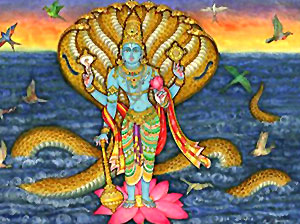 Infernal deities have been mentioned in the ancient texts as important characters. Nirritu is one of the Rudras who is also often named in the place of Surya. He is regarded as the guardian of the south-west quarter. He is draped in deep yellow and man is his vehicle. In the Rig Veda he is referred as worshipped by the "spider-like Danavas," the" black Asuras," the "black Dasyus," and other enemies of "the white-complexioned sons of Indra."
Infernal deities have been mentioned in the ancient texts as important characters. Nirritu is one of the Rudras who is also often named in the place of Surya. He is regarded as the guardian of the south-west quarter. He is draped in deep yellow and man is his vehicle. In the Rig Veda he is referred as worshipped by the "spider-like Danavas," the" black Asuras," the "black Dasyus," and other enemies of "the white-complexioned sons of Indra."
Nagas are of the Scythic race of snake-worshippers. Snake worship survives throughput India. Battisa Siralen, a town in Maharashtra is famous as a place of serpent-worship. One of the most dedicated temples to the snakes is at Bhomaparanden in Hyderabad.
Sesha Naga or Ananta is considered as the king of the Nagas. Sesha Naga is identified with Vamuki who is also called the King of the Nagas. As per history Vamuki is considered as the King of the Nagas. Sesha is an allegorical personification. The ishutas or ghosts are Lord Siva`s attendants. Dakinis or Asrapas, Sakinis and the Yoginis are attendants of Goddess Parvati. In Mumbai they are worshipped on 30th Sravana.
Ravana was the demon king of Lanka and was overthrown by Lord Rama. Vitthal is a demon king who is worshipped in Sawantwadi in Mumbai. He is also widely known under the name of Vital-Pachisi or Baital-Pachisi .
This article is a stub. You can enrich by adding more information to it. Send your Write Up to content@indianetzone.com









